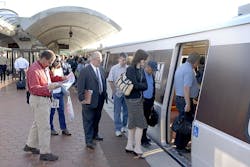WMATA outlines proposed cuts as it faces a $750 million budget gap in FY25
Washington Metropolitan Area Transit Authority (WMATA) is proposing a series of service cuts to bridge a $750 million funding gap in its Fiscal Year 2025 budget. The authority called the budget gap “large and structural” with operations funded by fares, other revenues, state and local subsidies and temporary COVID-related federal funding relief.
The funding crisis has been exacerbated by the pandemic, which destabilized WMATA’s existing operating model with changes to post-pandemic travel patterns and historic inflation. WMATA is structured without any independent funding and is legally required to pass a balanced budget every year.
The authority has attempted to find internal savings, including $95 million in one-time savings carried over from FY24, $50 million in recurring annual savings and a hiring and wage freeze. In a Dec. 14, 2023, report to the WMATA Finance and Capital Committee, the authority shared “regardless of proactive management actions taken by Metro to control expenses, under the current subsidy model Metro faces a structural funding shortfall of $750 million in FY2025, a deficit equal to more than 25 percent of the operating budget.”
“Metro is facing an unprecedented, existential crisis that requires our region to rally together if we want to avoid the catastrophic impacts this budget would have on our region,” said WMATA General Manager and CEO Randy Clarke. “I’m so proud of Metro and our dedicated workforce that has helped deliver over a dozen recent service improvements and are providing great service for our region all day, seven days a week. We are doing everything in our power to avoid the doomsday scenario outlined in this budget proposal, but we must also be transparent and honest about how devastating these cuts would be if additional funding isn’t secured.”
The proposed cuts to WMATA service
WMATA says, starting in January, it will implement a hiring freeze, eliminate wage and salary increases and issue legally required layoff notices to portions of its workforce alerting them to the potential of layoffs next summer if additional funding is not provided. Customers could begin to see degraded service as early as late winter or early spring with the combined impact of workforce attrition.
The authority explains customers would “pay more for much-degraded service” as the proposal includes a 20 percent fare increase for all services including Metrorail, Metrobus, MetroAccess and discounted fare products.
The proposal would eliminate service on 67 of 135 Metrobus routes and reduce service on 41 of the remaining routes. For MetroAccess riders, the service area would be reduced to align with reduced Metrobus and Metrorail service; a move WMATA says will negatively impact 320,000 annual trips.
All 121.5 million Metrorail trips would be impacted by the proposed service cuts, which include closing the system at 10 p.m. every night – it currently operates until midnight Sunday through Thursday and until 1:00 a.m. Friday and Saturday. The authority proposes closing 10 low-ridership stations, reducing weekday service between 17 percent and 67 percent and reducing weekend service between 40 percent and 70 percent.
Impacts to capital budget
WMATA is proposing the use of $193 million in capital funding to cover operating maintenance expenses in FY25. The authority explains it is “reluctantly proposing” the move as its recent capital program has produced improved customer experience and less frequent infrastructure-related service disruptions. However, WMATA explains the shift is necessary to provide even a reduced level of service in FY25.
The authority recognizes the transfer of capital funding is not without risk and cautions the system’s state of good repair, as well as long-term projects including regular corrective maintenance, the construction of a new railcar and overhaul facility, purchase of 8000-series railcars and the Better Bus initiative could be delayed, deferred or canceled.
Next steps
Between now and February, WMATA staff and the Board of Directors will finalize a budget proposal for the public’s input and comments. Updates, as well as information on the public comment period will be available at wmata.com/budget.
About the Author

Mischa Wanek-Libman
Group Editorial Director
Mischa Wanek-Libman is director of communications with Transdev North America. She has more than 20 years of experience working in the transportation industry covering construction projects, engineering challenges, transit and rail operations and best practices.
Wanek-Libman has held top editorial positions at freight rail and public transportation business-to-business publications including as editor-in-chief and editorial director of Mass Transit from 2018-2024. She has been recognized for editorial excellence through her individual work, as well as for collaborative content.
She is an active member of the American Public Transportation Association's Marketing and Communications Committee and served 14 years as a Board Observer on the National Railroad Construction and Maintenance Association (NRC) Board of Directors.
She is a graduate of Drake University in Des Moines, Iowa, where she earned a Bachelor of Arts degree in Journalism and Mass Communication.
